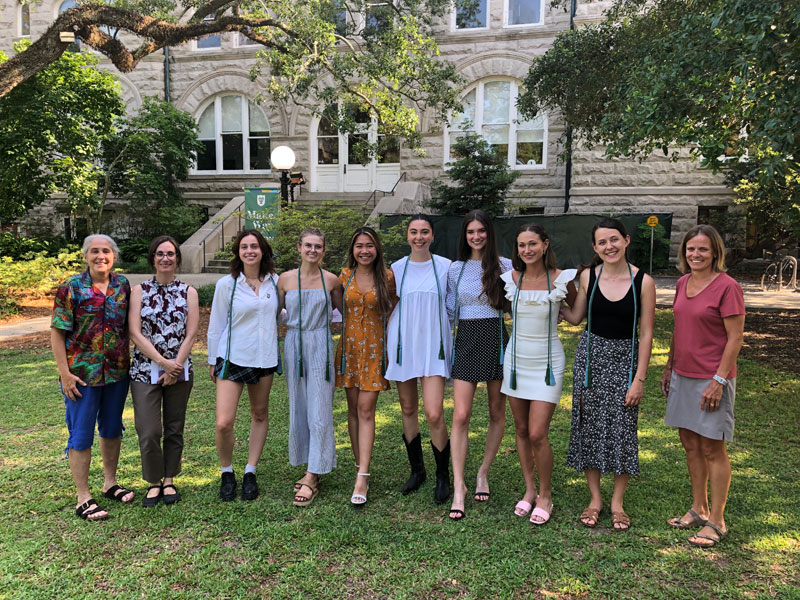
An honors thesis is a year-long research project completed during the senior year. Neuroscience majors are not required to do an honors thesis. Successful completion of an honors thesis qualifies the student to graduate with departmental and university honors. For specific information about the requirements for graduating with Honors, contact the Office of Academic Enrichment, 105/106 Hébert Hall, 504-314-2806.
An empirical research project is required for an Honors Thesis in Neuroscience. An empirical research project includes the design, implementation, analysis, and write-up of an original experiment that tests a specific scientific hypothesis. Non-laboratory projects, such as papers based solely on library research, clinical internships, or community service activities, do not meet the standards of an Honors Thesis in Neuroscience. Completion of an Honors Thesis in Neuroscience requires two full semesters, typically conducted during the senior year. A student should only attempt an Honor Thesis in Neuroscience under the guidance of a faculty member with whom Independent Study has been pursued during one or more previous semesters.
Note: No student may receive academic credit for research activities if that student receives a salary or stipend for those activities. This policy applies to research conducted during the academic year and during the summer.
How do I sign up to do an Honors Thesis?
No later than the spring of your junior year, you should select a Neuroscience faculty member to serve as your thesis director. You might begin by approaching one of your instructors, or your Neuroscience major advisor. You also should review the list of Neuroscience research faculty, to learn about the research interests of the Neuroscience faculty members.
Students should be aware that space in faculty laboratories is limited. Thus, students are strongly encouraged to contact the faculty member well before the end of the spring semester of their junior year. Once the faculty member has agreed to serve as the thesis director, make plans with him or her to carry out preliminary work for the thesis during the spring or summer before the senior year.
Students should sign up for Honors Thesis credit, NSCI 4990 in the fall, and NSCI 5000 in the spring, of the senior year. You should go to the Office of Academic Enrichment (105 Hébert Hall) to pick up the guidelines and schedule well in advance of your registration for an honors thesis. Students who are doing an Honor's Thesis will need to fill out the Tulane Honor's Thesis and Neuroscience Honor's Thesis forms. The Honors Thesis Registration form needs to be filled out by the student and research faculty advisor (must be a Brain Institute faculty member ) and, once completed, should be emailed to Stefanie de Abreu. For additional information, look at the honors thesis web pages.
Students will need to submit a prospective and first chapter during the first semester and their completed draft to their full committee during the second semester, prior to their oral defense. Details and deadlines can be found on the Honors Program website. Second and third readers are responsible for reading and providing commentary on the final version of the honors thesis, which is submitted to the full thesis committee prior to the oral defense. Second and third readers are NOT responsible for editing sections of the honors thesis during preparation of the final version.
A schedule of specific dates can be found on the Honor's Thesis website.
Ethics Approval Deadlines
Students must secure prior approval for honors theses from the appropriate ethics committees by the end of the first semester of their senior year. Approval of empirical studies with human subjects or animal subjects must be obtained from the appropriate internal review board. Students should consult with their thesis advisors regarding this process. Review and approval normally requires at least one month. Therefore, it is important that all forms be submitted by the thesis advisor to the appropriate committee NO LATER THAN November 15.
Can I complete an honors thesis at the Tulane Medical Center, or at another institution?
Yes, however, students must adhere to the same guidelines as those given [below] for Independent Study projects.
Independent study projects:
Students who wish to perform an independent study project at another institution must have two faculty sponsors: One at the host institution, and one in the Neuroscience Major. The student must obtain prior approval from the Neuroscience sponsor for the project. The sponsor will communicate with the host institution sponsor to make sure that the work being performed meets our major requirements for independent study projects. Also, the grade for the project will be submitted by the Neuroscience sponsor, in consultation with the host institution sponsor.
At the beginning of the project, your host institution sponsor must submit, by letter or e-mail, a description of the project to your Neuroscience sponsor. It is essential that your Neuroscience sponsor and your host institution sponsor communicate with one another to evaluate your final work; otherwise, an incomplete grade may result.
Students may sign up for Independent study credit as NSCI 4910 or NSCI 4920. Independent study forms are available from the Neuroscience Office, 200 Flower Hall. This form must be completed by the student in consultation with and signed by the faculty member(s) supervising the research. After the completed form is returned to the Neuroscience office, the student will be cleared to add the independent study to his/her schedule.
